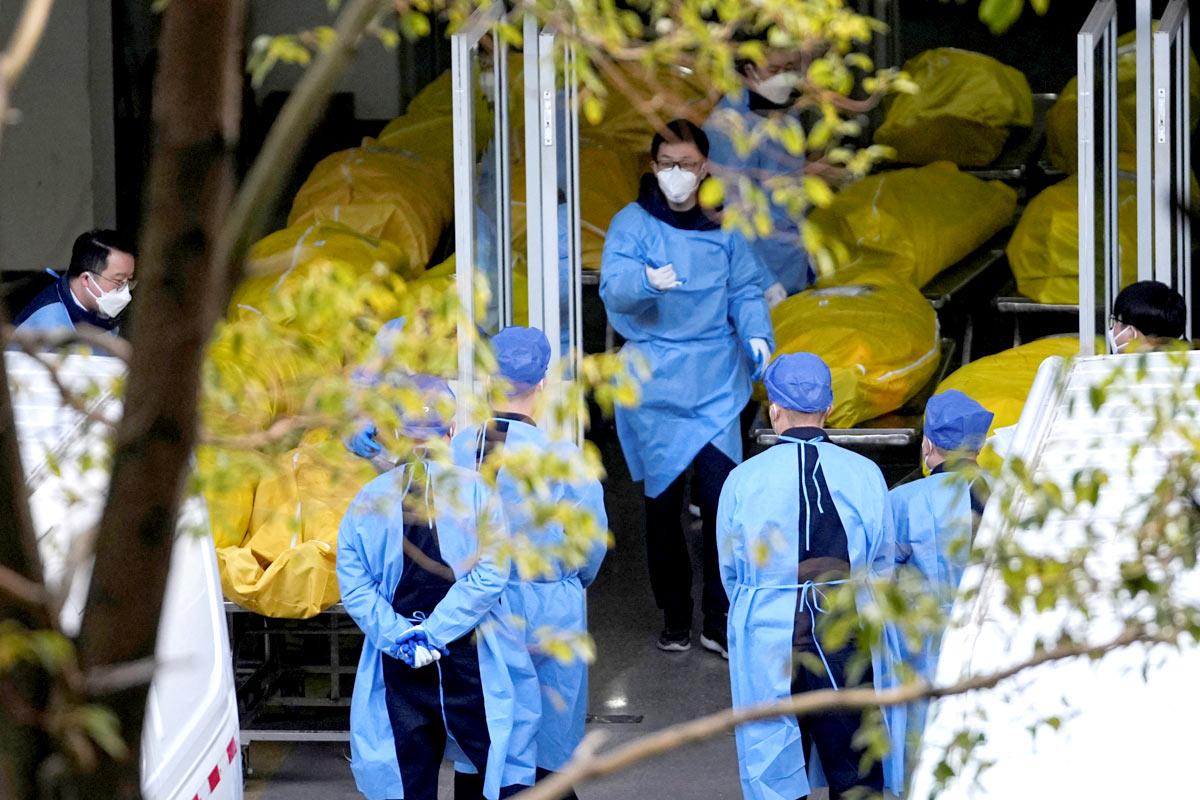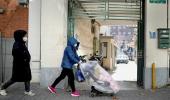China on Saturday reported nearly 60,000 coronavirus deaths in hospitals across the country over the last 30 days, amid criticism from the World Health Organisation that Beijing was heavily under-reporting the magnitude of the pandemic.

The death toll included 59,938 COVID-19 related deaths at hospitals from December 8 to January 12, the National Health Commission said on Saturday, official media reported.
Jiao Yahui, director of the National Health Commission's medical affairs department, said medical institutes recorded 5,503 deaths as a result of respiratory failure triggered by COVID-19 infections and 54,435 fatalities with underlying conditions, such as cancer or cardiovascular diseases, combined with COVID-19.
The average age of those who died was 80.3, and 90 per cent of the fatalities were aged 65 or over, the Hong Kong-based South China Morning Post reported.
With this, China's official death toll climbed to 65,210 since the coronavirus first broke out in the central Chinese city of Wuhan in December 2019.
China has stopped providing daily Covid statistics since abandoning its strict zero-Covid strategy.
China also reopened its borders to international travellers on January 8 after nearly three years.
The World Health Organisation said on Wednesday that China is "heavily underreporting" the number of COVID-19 deaths from the current wave of infections sweeping the country.
"The WHO still believes that deaths are heavily underreported from China. This is in relation to the definitions that are used but also to the need for doctors and those reporting in the public health system to be encouraged to report these cases and not discouraged," Michael Ryan, executive director of WHO Health Emergencies Programme said in Geneva.
The new death toll figures come as videos and reports in the social media showed that hospitals, morgues and crematoriums were being overwhelmed with bodies.
Families where deaths have taken place told the media that they were simply asked to leave the bodies at the morgues without mentioning dates for cremation and they would be handed over the ashes after cremation.
Since the virus broke, China was cagey about revealing the number of cases, especially the deaths in view of the political ramifications.
The stringent zero-Covid policy, which was lifted last month after rare anti-government protests against President Xi Jinping, who was re-elected for an unprecedented third term in October last year.
As soon as the restrictions were lifted, a massive Covid wave fuelled by Omicron variants overwhelmed Beijing and several other cities with a steady rise in fatalities.
Health experts here said the country perhaps saw the fastest transmission of the virus with millions getting infected every day.
According to the latest study by Peking University, some 900 million people in China have been infected with the virus as of January 11, 2023.
The report estimates that 64 per cent of the country's population is infected with the virus, the BBC reported on Friday.
The study ranks Gansu province, where 91 per cent of the people are reported to be infected, at the top, followed by Yunnan (84 per cent) and Qinghai (80 per cent).
Beijing, which is hit by Omicron sub-variant BF.7, has announced seven deaths, but later stopped announcing any data of cases and deaths.
China's National Health Commission announced that only Covid-19 patients who die from respiratory failure will be counted towards the official death toll.
Deaths caused by pneumonia and respiratory failure resulting from Covid-19 will be classified as Covid deaths, while deaths caused by other underlying diseases, such as cardiovascular and cerebrovascular diseases, will not be counted as Covid-induced deaths,” Wang Guiqiang, an adviser to the NHC and director of the infectious diseases department at Peking University First Hospital said.
He justified lifting of restrictions, saying that Omicron, the variant fuelling the current surge in cases, was becoming less lethal and China was increasing the vaccination rate, which meant the pattern of infections and deaths was changing.
Since last month, the WHO is consistently critical of China not sharing COVID data especially that of deaths and admissions to ICUs.
Chinese Foreign Ministry spokesman Wang Wenbin in response to WHO criticism said on Thursday that Beijing has been sharing Covid data in "a timely, open and transparent manner in accordance with the law," having held technical exchanges with the WHO over the past month.
Global concerns over China's current wave of Covid cases rose as Beijing on January 8 opened its borders after three years, welcoming international travellers and returning residents without the need to quarantine even as infections continue to surge after it scrapped its stringent zero-Covid policy.
Several countries including India have called for negative PCR tests for travellers arriving from China, which Beijing criticised as politically discriminatory and warned of counter measures.
A top Chinese epidemiologist has also warned that cases will surge in rural China during the Chinese New Year and Spring Festival starting from January 22.
Already millions of Chinese are travelling to their home villages and tourist destinations. The celebrations will last about 40 days.
Some two billion trips are expected to be made in total and tens of millions of people have already travelled.
The peak of China's Covid wave is expected to last two to three months, said Zeng Guang, ex-head of the Chinese Centre for Disease Control.
Reports say hospitals in big cities --- where healthcare facilities are better and more easily accessible --- have become crowded with patients, as the virus raged through the country.
Zeng said it was "time to focus on the rural areas", in remarks reported in the Caixin news outlet.
Many elderly, sick and disabled in the countryside were already being left behind in terms of Covid treatment, he added.
China's central Henan province is the only province to have given details of the infection rates.
Earlier this month, a health official in that province said nearly 90 per cent of the population had Covid, with similar rates being reported in urban and rural areas.











 © 2025
© 2025